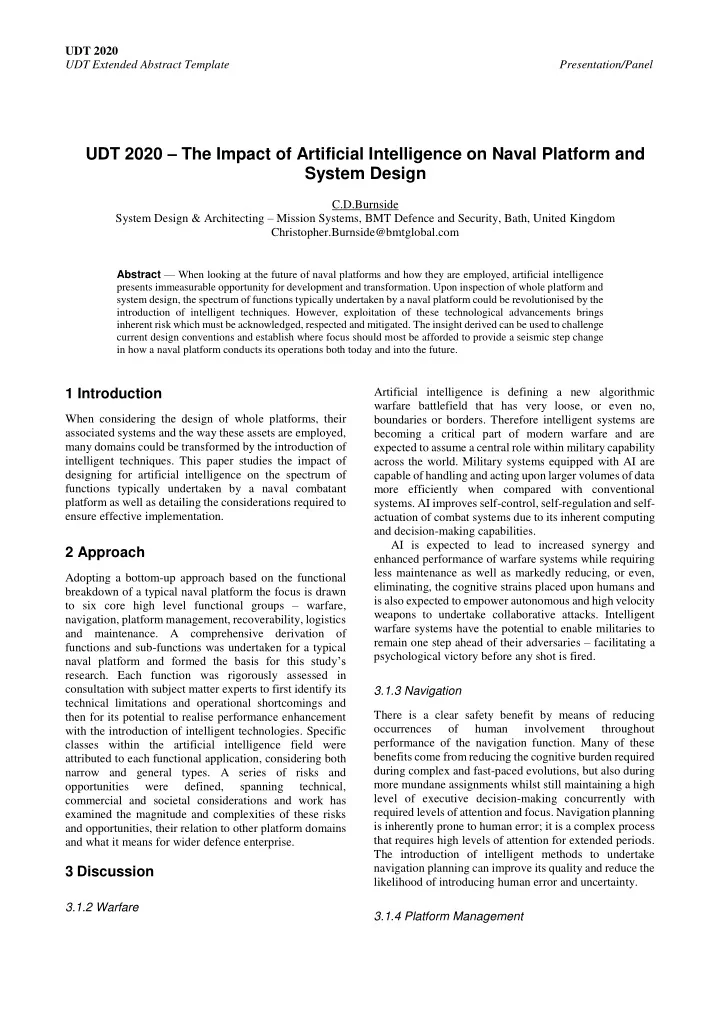

UDT 2020 UDT Extended Abstract Template Presentation/Panel UDT 2020 – The Impact of Artificial Intelligence on Naval Platform and System Design C.D.Burnside System Design & Architecting – Mission Systems, BMT Defence and Security, Bath, United Kingdom Christopher.Burnside@bmtglobal.com Abstract — When looking at the future of naval platforms and how they are employed, artificial intelligence presents immeasurable opportunity for development and transformation. Upon inspection of whole platform and system design, the spectrum of functions typically undertaken by a naval platform could be revolutionised by the introduction of intelligent techniques. However, exploitation of these technological advancements brings inherent risk which must be acknowledged, respected and mitigated. The insight derived can be used to challenge current design conventions and establish where focus should most be afforded to provide a seismic step change in how a naval platform conducts its operations both today and into the future. 1 Introduction Artificial intelligence is defining a new algorithmic warfare battlefield that has very loose, or even no, When considering the design of whole platforms, their boundaries or borders. Therefore intelligent systems are associated systems and the way these assets are employed, becoming a critical part of modern warfare and are many domains could be transformed by the introduction of expected to assume a central role within military capability intelligent techniques. This paper studies the impact of across the world. Military systems equipped with AI are designing for artificial intelligence on the spectrum of capable of handling and acting upon larger volumes of data functions typically undertaken by a naval combatant more efficiently when compared with conventional platform as well as detailing the considerations required to systems. AI improves self-control, self-regulation and self- ensure effective implementation. actuation of combat systems due to its inherent computing and decision-making capabilities. AI is expected to lead to increased synergy and 2 Approach enhanced performance of warfare systems while requiring less maintenance as well as markedly reducing, or even, Adopting a bottom-up approach based on the functional eliminating, the cognitive strains placed upon humans and breakdown of a typical naval platform the focus is drawn is also expected to empower autonomous and high velocity to six core high level functional groups – warfare, weapons to undertake collaborative attacks. Intelligent navigation, platform management, recoverability, logistics warfare systems have the potential to enable militaries to and maintenance. A comprehensive derivation of remain one step ahead of their adversaries – facilitating a functions and sub-functions was undertaken for a typical psychological victory before any shot is fired. naval platform and formed the basis for this study’s research. Each function was rigorously assessed in consultation with subject matter experts to first identify its 3.1.3 Navigation technical limitations and operational shortcomings and There is a clear safety benefit by means of reducing then for its potential to realise performance enhancement occurrences of human involvement throughout with the introduction of intelligent technologies. Specific performance of the navigation function. Many of these classes within the artificial intelligence field were benefits come from reducing the cognitive burden required attributed to each functional application, considering both during complex and fast-paced evolutions, but also during narrow and general types. A series of risks and more mundane assignments whilst still maintaining a high opportunities were defined, spanning technical, level of executive decision-making concurrently with commercial and societal considerations and work has required levels of attention and focus. Navigation planning examined the magnitude and complexities of these risks is inherently prone to human error; it is a complex process and opportunities, their relation to other platform domains that requires high levels of attention for extended periods. and what it means for wider defence enterprise. The introduction of intelligent methods to undertake navigation planning can improve its quality and reduce the 3 Discussion likelihood of introducing human error and uncertainty. 3.1.2 Warfare 3.1.4 Platform Management
Recommend
More recommend